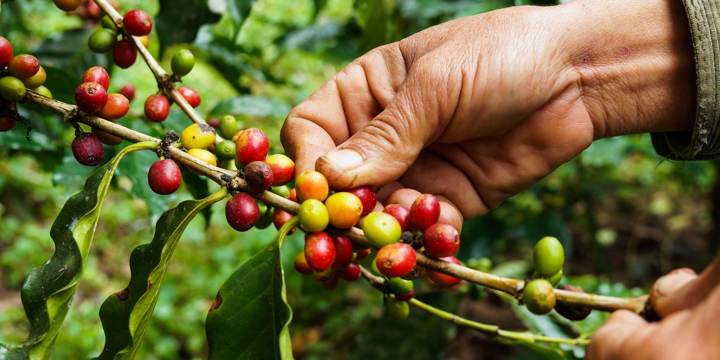
What Gives Flying West Coffee Its Flavour? Part I: Country of Origin, Processing, Drying & Storage
Have you ever wondered what gives coffee its unique flavour? The answer is more multi-layered than you probably imagined! Coffee is one of the most complex beverages with over 1500 chemical compounds in one cup. Like wine, there are many factors which determine exactly how your cup of coffee tastes. We’ve put together a brief overview in three parts, and over the next few weeks we will be sharing these with you to help you get up to speed and educated on what makes a truly delicious coffee!
There are many different species of coffee – over 100, according to World Coffee Research (WCR) – but the main two are Arabica and Robusta. Being a speciality coffee roastery, we work ONLY with Arabica, the finest quality of the species.
Coffee also has varieties/varietals (different variations within the species) all of which can affect the flavour of the coffee.
Bourbon is known for its sweet taste and fruity characteristics.
Gesha is known for tea-like qualities, showing traits of jasmine and vanilla.
Typica commonly delivers a cup that has a sweet acidity and medium body.
Caturra is a natural mutation of the Bourbon varietal. It generally shows a more citric acidity like lemon and lime notes.
This just highlights a few of the varietals. There are many more varietals, hybrids and mutations.
Harvesting, Processing and Drying
Since coffee is a fruit, the harvesting time determines the flavour profile. If fruit is picked when it’s still green, the sweetness hasn’t had time to develop. It’s the same with coffee and the closest to being perfectly ripe-the sweeter, cleaner and smoother it tastes. After harvest, the processing determines the coffee’s flavour and aroma.
During processing, three main techniques are used: wet/washed, semi-washed/ honey or natural/dried-in-the-fruit. Each method influences flavour in the following ways:
In the wet process, the fruit covering the seeds/beans is removed before they are dried. Washed coffees, depend almost 100% on the bean having absorbed enough natural sugars and nutrients during its growing cycle. This means the growing conditions and environmental factors are absolute key.
During the semi-washed/honey method coffee flesh is removed but the thin, sweet mucilage layer of pectin (sugar) surrounding the bean remains intact while the bean dries. This tends to enhance sweetness.
If the coffee is naturally (Dry/Natural) processed then the fruit is harvested and put out to dry, fully intact with its fruit skin on the bean. This produces coffee that is heavy in body, sweet, smooth, fruit forward and complex.
Coffee must be stored in dry and cool conditions. Exposure to the sun or moisture will rapidly deteriorate the coffee.
After the grading and sorting, the coffee beans are packed for transport from origin, most commonly in 60 kg or 70 kg natural fiber bags, made from jute, sisal or burlap.
Higher grade or very fragile coffees are often vacuum packed in a laminated multilayer polythene ‘GrainPro’ bag. This preserves their flavours better, for longer.
Our Single Origins
We select a small amount of Single Origins each week so that the products we offer are of the highest quality. It is critical to know the processing method as well as the quality of the coffee to ensure the coffee is roasted to its absolute potential.
